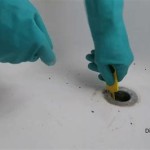How To Get Rid Of Rust In A Sink
Rust, a reddish-brown iron oxide, is a common problem in sinks, particularly those made of cast iron, stainless steel, or porcelain. It forms when iron reacts with oxygen and moisture. While rust may seem like a purely aesthetic issue, if left untreated, it can progressively damage the sink's surface, leading to pitting and eventual structural degradation. Therefore, timely and effective rust removal is crucial for maintaining the longevity and appearance of a sink.
The formation of rust in a sink is usually attributed to several factors. Drips from rusty pipes or fixtures, contact with rusty objects left in the sink (such as tools or cans), hard water deposits that contain iron, and scratches or chips in the sink's protective coating can all contribute to rust development. Understanding the cause of the rust is essential for preventing its recurrence after removal.
Various methods can be employed to remove rust from a sink, ranging from the utilization of common household ingredients to the application of commercial rust removers. The choice of method often depends on the severity of the rust and the type of sink material. It is important to consider the potential abrasive nature of each method, as aggressive scrubbing can damage softer surfaces like porcelain.
Baking Soda and Water Paste
Baking soda, also known as sodium bicarbonate, is a mild alkali that is effective in removing light surface rust. Its gentle abrasive properties help to lift the rust without causing significant damage to most sink surfaces. This method is particularly suitable for porcelain and stainless steel sinks.
To use this method, a paste needs to be prepared by mixing baking soda with water. The consistency of the paste should be thick enough to adhere to the rusted areas. Apply the paste generously to the affected areas and allow it to sit for at least an hour, or preferably overnight for more stubborn stains. After soaking, use a non-abrasive sponge or cloth to scrub the rust. The baking soda particles will help to loosen and lift the rust. Rinse the sink thoroughly with water to remove any remaining baking soda residue. Repeat the process if necessary.
For heavily rusted areas, the effectiveness of the baking soda paste can be enhanced by adding a small amount of vinegar. Vinegar, a mild acid, helps to dissolve the rust, making it easier to remove with the baking soda. However, it is crucial to use this combination cautiously, especially on delicate surfaces, as the acidic nature of vinegar can potentially cause etching or discoloration.
When using the baking soda and vinegar combination, apply the baking soda paste first, then lightly spray or drizzle vinegar onto the paste. Allow the mixture to fizz for a few minutes, then scrub gently. Rinse thoroughly with water. Observe the sink's surface carefully for any signs of damage. If any discoloration or etching occurs, discontinue use and try a different method.
Baking soda and water paste offers a gentle and environmentally friendly way to remove light rust stains. Its non-toxic nature makes it a safe option for households with children and pets.
Lemon Juice and Salt
The combination of lemon juice and salt presents another effective method for removing rust from a sink. Lemon juice contains citric acid, which acts as a natural rust solvent, helping to break down the iron oxide. Salt acts as a mild abrasive, aiding in the removal of the loosened rust particles.
To utilize this method, cut a lemon in half and sprinkle salt generously onto the cut surface. Alternatively, lemon juice can be squeezed into a bowl and mixed with salt to form a paste. Rub the salted lemon half directly onto the rusted areas of the sink, or apply the lemon juice and salt paste. Allow the lemon juice and salt to sit on the rust for at least 30 minutes, or longer for more persistent stains. The citric acid will react with the rust, loosening its hold on the sink surface.
After the soaking period, use the lemon half or a non-abrasive sponge to scrub the rust. The salt particles will provide a gentle abrasive action, helping to detach the loosened rust. Rinse the sink thoroughly with water to remove any remaining lemon juice and salt residue. Dry the sink to prevent further rust formation.
The lemon juice and salt method is particularly effective for removing rust stains around drains and faucets. The direct application of the lemon half allows for targeted treatment of these hard-to-reach areas. Furthermore, the natural antibacterial properties of lemon juice can help to disinfect the sink surface.
This method offers an advantage over stronger chemical solutions due to its natural and non-toxic nature. It is safe for use on most sink surfaces, including stainless steel and porcelain, but caution should be exercised when using it on more delicate or antique sinks. A test in an inconspicuous area is recommended before applying it to the entire sink.
Commercial Rust Removers
For more stubborn or widespread rust, commercial rust removers may be necessary. These products typically contain stronger acids or chemical agents designed to dissolve and remove rust quickly and effectively. It is crucial to exercise caution when using commercial rust removers, as they can be corrosive and potentially harmful if not handled properly.
Before using any commercial rust remover, it is imperative to read and follow the manufacturer's instructions carefully. Wear appropriate protective gear, including gloves, eye protection, and a mask, to prevent skin and respiratory irritation. Ensure adequate ventilation in the work area to avoid inhaling harmful fumes.
Apply the rust remover to the affected areas of the sink, following the recommended application time. Avoid prolonged contact with the sink surface, as this can lead to damage or discoloration. After the recommended soaking period, scrub the rust-affected areas with a non-abrasive sponge or brush. Rinse the sink thoroughly with water to remove all traces of the rust remover. Dry the sink completely to prevent future rust formation.
There are various types of commercial rust removers available, including liquids, gels, and pastes. Choose a product that is specifically designed for use on the type of sink material you have. Some rust removers are formulated for use on stainless steel, while others are designed for porcelain or cast iron. Using the wrong type of rust remover can damage the sink surface.
When selecting a commercial rust remover, consider its environmental impact. Opt for products that are biodegradable and contain fewer harsh chemicals. Dispose of any leftover rust remover properly, following the manufacturer's instructions and local regulations.
While commercial rust removers can be highly effective, they should be used as a last resort, after trying gentler methods first. Regular cleaning and preventative measures can often eliminate the need for these stronger chemical solutions.
Regardless of the method used, prevention is key to avoiding future rust problems. Regularly cleaning the sink and drying it after each use will help to prevent moisture buildup, which is essential for rust formation. Consider using a water softener to reduce the amount of iron in the water supply. Repair any leaky faucets or pipes promptly to prevent water from dripping onto the sink. Avoid leaving rusty objects in the sink for extended periods. By taking these preventative measures, the sink's pristine condition can be maintained for years to come.

Rust In Your Stainless Steel Sink Duncan S Creative Kitchens

How To Remove Rust Stains From Toilets Tubs And Sinks

How To Remove Rust Stains From Sink Tub Mr Handyman

How To Remove Rust Stains From A Porcelain Sink

Removing A Rust Stain From Sink Youtube

How To Remove Rust Stains From A Porcelain Tub Or Sink Cabana State Of Mind

How To Get Rid Of Iron And Rust Stains Once For All Water Right

How To Remove Rust From Kitchen Sink Drain A Comprehensive Guide Arcora Faucets

How To Clean Rust Stains Off Of A Stainless Steel Sink Living On Dime

Remove Rust From An Antique Sink Hometalk







